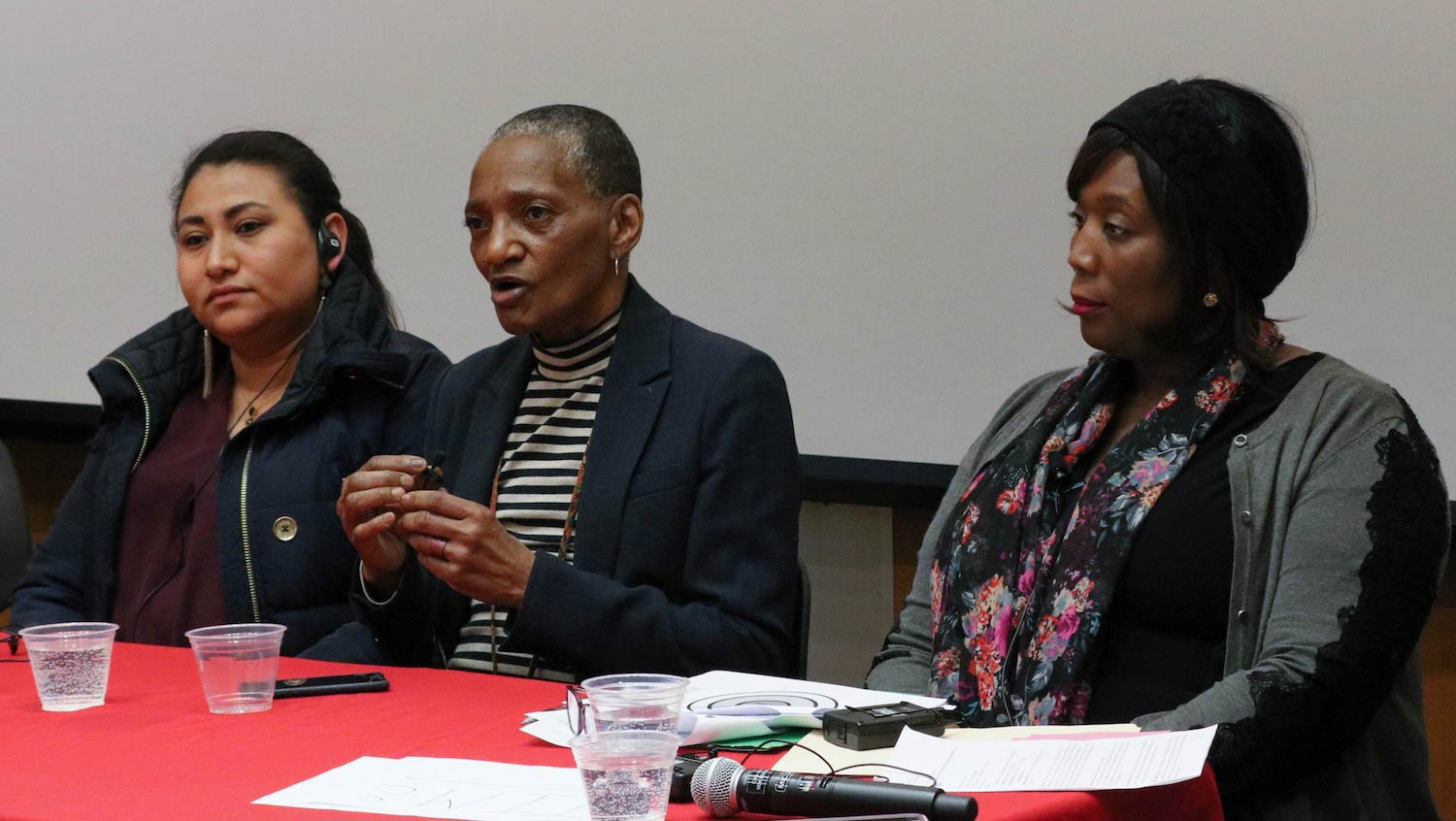
Nilagia McCoy (CISWH)
What unseen health effects are caused by eviction, rent hikes, and the threat of foreclosure? How can healthcare providers and community organizers work together to bring more equity to our housing landscape? Is safe and affordable housing a human right? These were some of the big questions on the agenda at a recent panel discussion on housing justice and health equity hosted by the Boston University Center for Innovation in Social Work & Health. The panel featured Thea James, VP of Mission at Boston Medical Center, who has played a central role in the hospital’s housing initiatives, flanked by a pair of housing activists and community organizers, Gabrielle René and Noemy Rodriguez, from the grassroots organization City Life/Vida Urbana. The impassioned and wide-ranging discussion, moderated by Dawn Belkin Martinez, a clinical associate professor at the BU School of Social Work who focuses on social justice, spanned run-ins with developers and landlords, ongoing community organizing efforts, and the recent push to revive rent control in Boston. Rodriguez, a native of El Salvador who spoke through an interpreter, highlighted what she described as an acute eviction and rent crisis in East Boston. René detailed foreclosure fights and the recent gentrification surrounding a new commuter rail stop in Mattapan. In each of the anecdotes and examples, the insidious effects of housing instability on health shone through: the psychological stress, the impact on children and families, and, above all, the sleeplessness. The basic human need to have a safe place to lay one’s head at night was a theme that emerged over and over. Some highlights from the discussion, in the panelists’ own words: Gabrielle René | The issue is vast. I was at the courthouse today with a lady, she’s been living at her house for 30 years. Thirty years — since 1989. And now her landlord is trying to put her out because she’s in the South End, and they want that place. They want that apartment, and they’re doing everything [to get it]. When you cannot go home and sleep peacefully, it affects your daily life. It affects everything. Like so many people, I didn’t know what I was dealing with were systemic issues. That’s how we internalize those things, and we become ashamed. We think, “Maybe there’s something I could have done.” There’s nothing you can do because the odds are stacked up against you. Noemy Rodriguez | Three years ago, I went through an eviction. It made me very worried because I had my three sons, and it was very hard for me to get an apartment. The landlord tried to evict me just seven months after I started living there because he wanted to increase the rent. … I remember going to the doctor because I couldn’t sleep. I was so worried. People are not aware of the terrible conditions of the apartments where people live. … This is a risk for health. Our children are victims of sickness of lead or the environment where we live. We live in the airport area, so we are surrounded by fuel. We have a lot of cases of asthma among us. Thea James | Imagine these are our patients, and they are having to … make hard decisions, with whatever resources they have available, between shelter for their families, food for their families, being able to sleep well — and using those resources to pay for a co-pay for a doctor’s visit, make sure they make [it to] a doctor’s appointment, or purchase a prescription. Health and healthcare will always rank second. We invested in an equity fund in Boston called the Healthy Neighborhood Equity Fund. This equity fund will only fund developments that provide opportunities for access to affordable housing, employment, green walking space, transit, and affordable and healthy food. … That equity fund supported development of … 323 new units of market-moderate and affordable housing, some to own, some to rent. To make an effective intervention, people in healthcare also have to understand the big picture. They have to understand the history. They have to understand how these communities became that way. They absolutely have to understand redlining and what happened back in the 1930s to create structural barriers. Gabrielle René | When you’re going through a housing crisis, going to the doctor for your checkup is not something you’re thinking about. For three years, I didn’t go see my doctor. I was paying for healthcare, but I never went to see my doctor, because my mindset was, let me get my housing crisis situated. Noemy Rodriguez | I don’t know if you know, but the rents in East Boston have increased enormously in the last three years. It’s so hard to be able to afford the rent. This worries us enormously because we are working class, [making] minimum wage, and there’s no way we can afford that. This is bad because for us to be able to continue living in East Boston, we have to have three jobs to be able to make the money we need to pay the rent. Gabrielle René | Housing is a human right. … If you don’t have a place to lay your head, forget it. Every single day we have families who cannot sleep. We know how important sleep is. It affects everything. You cannot function at work. You cannot function as a child at school. You cannot function as an employee. You cannot function as a spouse, as a husband or wife. You cannot function if you are dealing with a housing crisis. Dawn Belkin-Martinez | The city’s policy over the past 10 years has been, “Build, build, build, and things will get better.” And for those of you who are fans of evidence-based data, you know that’s not true, because what’s happened is more evictions, more gentrification, more people that are being foreclosed on. … What can we do — as a community, as healthcare workers, as residents — to help in the struggle to prevent eviction and displacement? Gabrielle René | Join in wherever you can join in. You do…
What unseen health effects are caused by eviction, rent hikes, and the threat of foreclosure? How can healthcare providers and community organizers work together to bring more equity to our housing landscape? Is safe and affordable housing a human right?
These were some of the big questions on the agenda at a recent panel discussion on housing justice and health equity hosted by the Boston University Center for Innovation in Social Work & Health. The panel featured Thea James, VP of Mission at Boston Medical Center, who has played a central role in the hospital’s housing initiatives, flanked by a pair of housing activists and community organizers, Gabrielle René and Noemy Rodriguez, from the grassroots organization City Life/Vida Urbana.
The impassioned and wide-ranging discussion, moderated by Dawn Belkin Martinez, a clinical associate professor at the BU School of Social Work who focuses on social justice, spanned run-ins with developers and landlords, ongoing community organizing efforts, and the recent push to revive rent control in Boston. Rodriguez, a native of El Salvador who spoke through an interpreter, highlighted what she described as an acute eviction and rent crisis in East Boston. René detailed foreclosure fights and the recent gentrification surrounding a new commuter rail stop in Mattapan.
In each of the anecdotes and examples, the insidious effects of housing instability on health shone through: the psychological stress, the impact on children and families, and, above all, the sleeplessness. The basic human need to have a safe place to lay one’s head at night was a theme that emerged over and over.
Some highlights from the discussion, in the panelists’ own words:
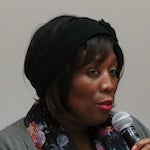
Gabrielle René | The issue is vast. I was at the courthouse today with a lady, she’s been living at her house for 30 years. Thirty years — since 1989. And now her landlord is trying to put her out because she’s in the South End, and they want that place. They want that apartment, and they’re doing everything [to get it].
When you cannot go home and sleep peacefully, it affects your daily life. It affects everything.
Like so many people, I didn’t know what I was dealing with were systemic issues. That’s how we internalize those things, and we become ashamed. We think, “Maybe there’s something I could have done.” There’s nothing you can do because the odds are stacked up against you.
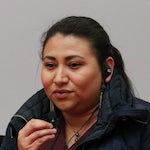
Noemy Rodriguez | Three years ago, I went through an eviction. It made me very worried because I had my three sons, and it was very hard for me to get an apartment. The landlord tried to evict me just seven months after I started living there because he wanted to increase the rent. … I remember going to the doctor because I couldn’t sleep. I was so worried.
People are not aware of the terrible conditions of the apartments where people live. … This is a risk for health. Our children are victims of sickness of lead or the environment where we live. We live in the airport area, so we are surrounded by fuel. We have a lot of cases of asthma among us.
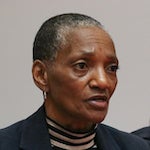
Thea James | Imagine these are our patients, and they are having to … make hard decisions, with whatever resources they have available, between shelter for their families, food for their families, being able to sleep well — and using those resources to pay for a co-pay for a doctor’s visit, make sure they make [it to] a doctor’s appointment, or purchase a prescription. Health and healthcare will always rank second.
We invested in an equity fund in Boston called the Healthy Neighborhood Equity Fund. This equity fund will only fund developments that provide opportunities for access to affordable housing, employment, green walking space, transit, and affordable and healthy food. … That equity fund supported development of … 323 new units of market-moderate and affordable housing, some to own, some to rent.
To make an effective intervention, people in healthcare also have to understand the big picture. They have to understand the history. They have to understand how these communities became that way. They absolutely have to understand redlining and what happened back in the 1930s to create structural barriers.
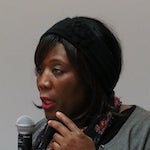
Gabrielle René | When you’re going through a housing crisis, going to the doctor for your checkup is not something you’re thinking about. For three years, I didn’t go see my doctor. I was paying for healthcare, but I never went to see my doctor, because my mindset was, let me get my housing crisis situated.
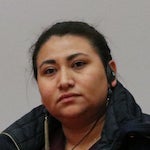
Noemy Rodriguez | I don’t know if you know, but the rents in East Boston have increased enormously in the last three years. It’s so hard to be able to afford the rent. This worries us enormously because we are working class, [making] minimum wage, and there’s no way we can afford that. This is bad because for us to be able to continue living in East Boston, we have to have three jobs to be able to make the money we need to pay the rent.

Gabrielle René | Housing is a human right. … If you don’t have a place to lay your head, forget it. Every single day we have families who cannot sleep. We know how important sleep is. It affects everything. You cannot function at work. You cannot function as a child at school. You cannot function as an employee. You cannot function as a spouse, as a husband or wife. You cannot function if you are dealing with a housing crisis.
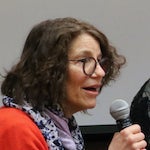
Dawn Belkin-Martinez | The city’s policy over the past 10 years has been, “Build, build, build, and things will get better.” And for those of you who are fans of evidence-based data, you know that’s not true, because what’s happened is more evictions, more gentrification, more people that are being foreclosed on. … What can we do — as a community, as healthcare workers, as residents — to help in the struggle to prevent eviction and displacement?

Gabrielle René | Join in wherever you can join in. You do your part. … Stand up and fight back with organizations like City Life and Right to the City, organizations that are saying “No, we have rights here, and we deserve to be part of this city without being marginalized and torn away.”

Thea James | Understand whoever it is you’re working with. Have a broad spectrum beyond whatever your role is supposed to be. … Set high bars for what’s possible for you to achieve for the people who are there looking for your assistance and your partnership.
All photographs courtesy of Nilagia McCoy, Boston University Center for Innovation in Social Work & Health.


